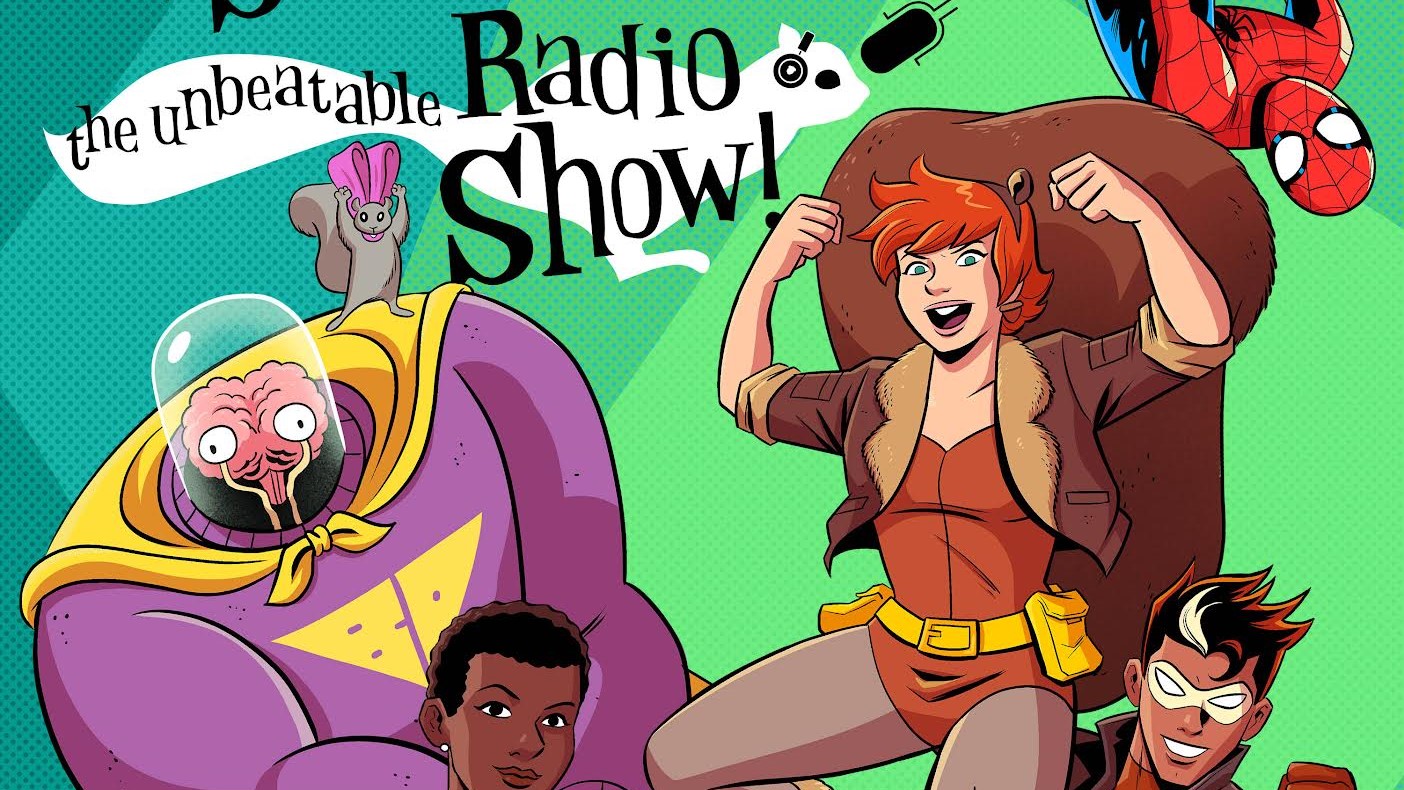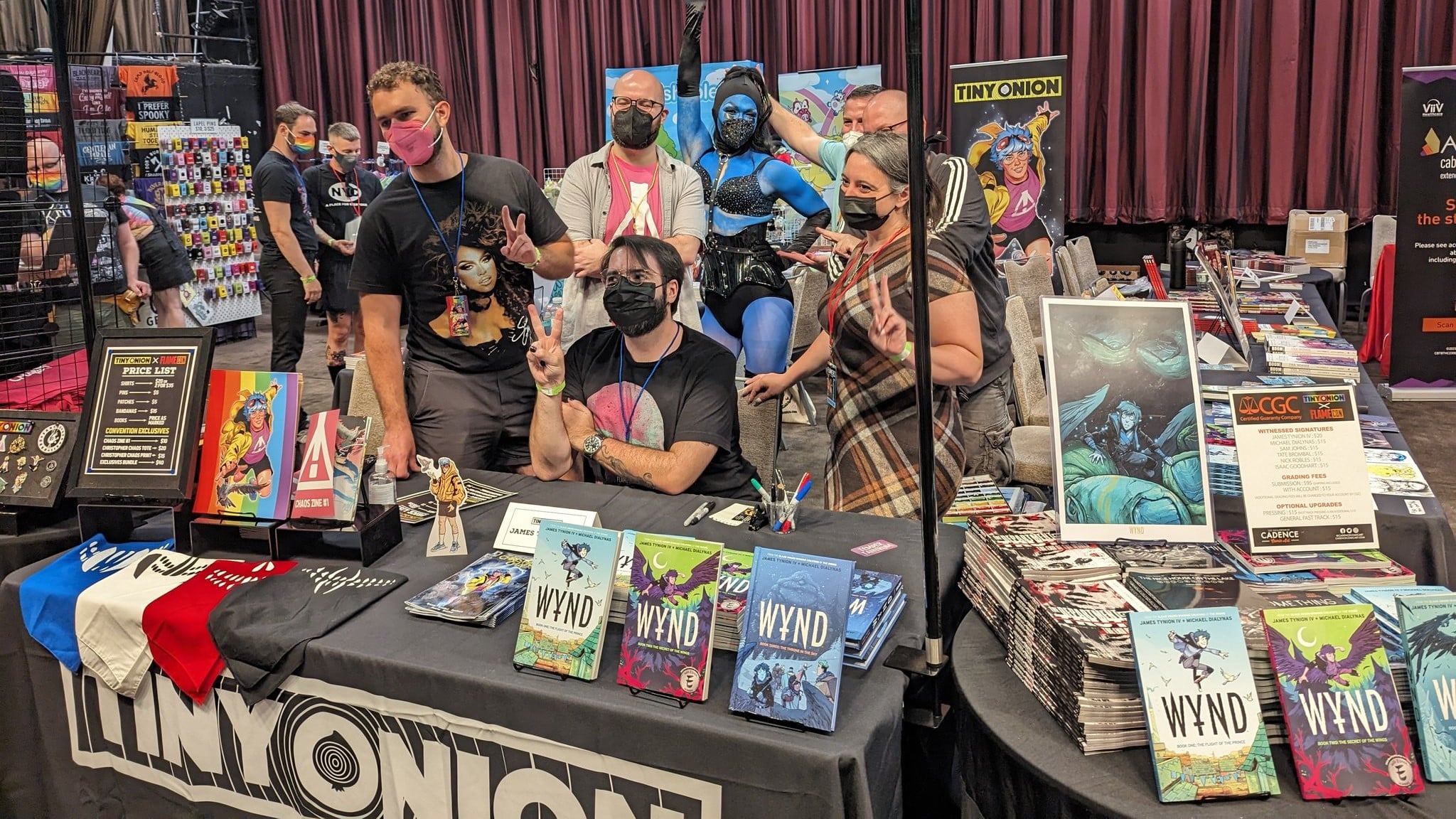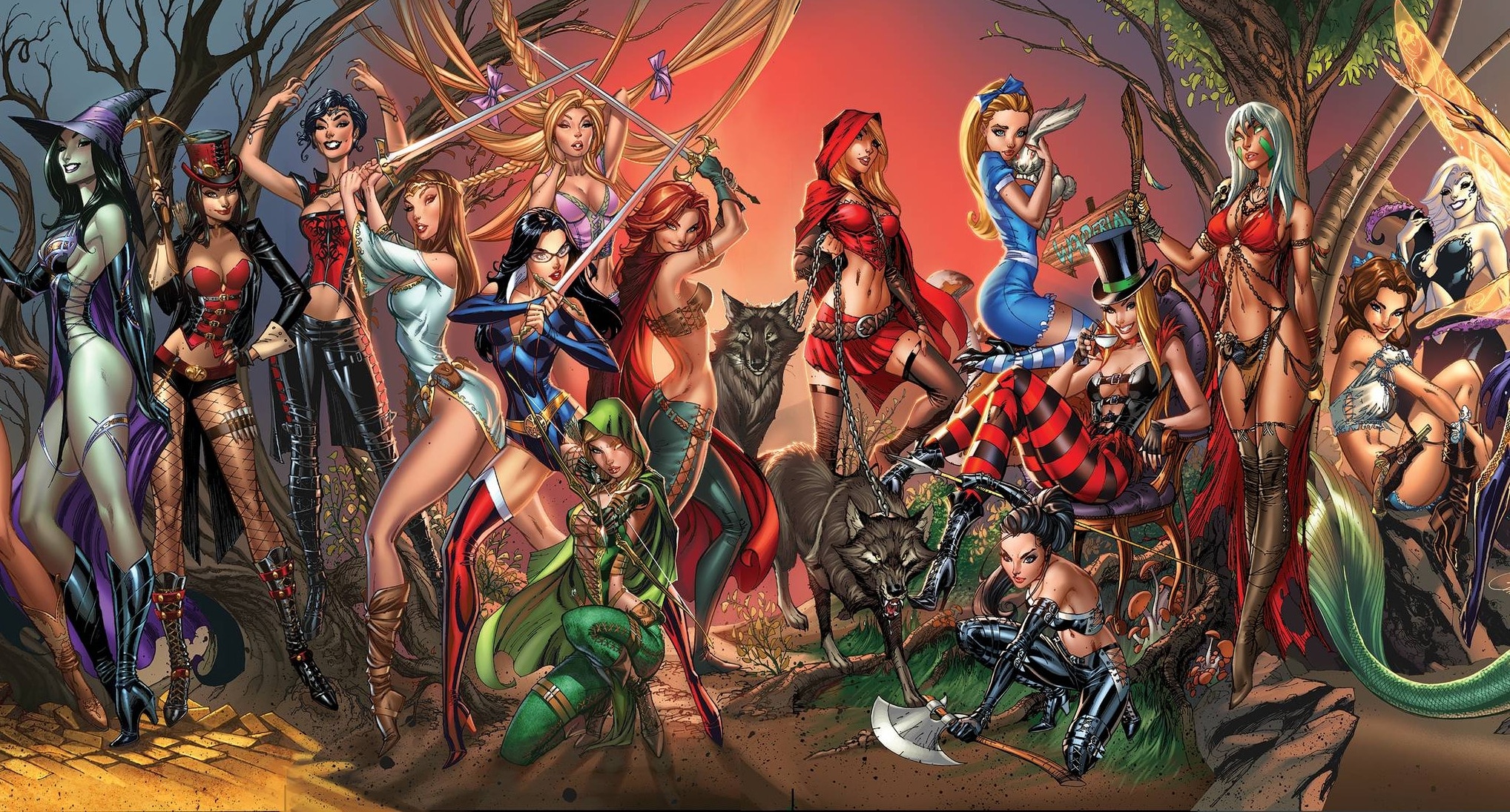Ryan North had a long, modern classic run on the comic The Unbeatable Squirrel Girl. He’s now returned to write a podcast about the character. It’s good. We talked to him about it.
Zachary Jenkins: Squirrel Girl: The Unbeatable Radio Show is a new, six part audio mini-series from Marvel and Sirius XM. This is this is obviously not your first time working with Squirrel Girl, you had a very long run with collaborators like Erica Henderson and Derek Charm that really defined the character as she is today. How did you get involved with this particular project?
Ryan North: I got an email from one of our producers Lorraine Cink and she was working on this idea for a Squirrel Girl call-in show. They said “we should ask if Ryan’s available because he knows these characters pretty well.” And they said, “what do you think that could be?” That was basically they just had the idea. There’s a lot of really fun things you can do there and I got really excited about it.
I knew it’d be a lot of work; so first I said “I will outline a story, but I don’t think I can write because that’s too much.” And then I outlined it all and I was really into this, I have to write it. And happily, they were they were down with that.
It was challenging, right? Because it’s a new medium that I’ve never written. Comics is a very visual medium where you can show these cool punches and stuff and I didn’t want to have that situation where you had character saying like, “Oh, no, she’s punching me with her left fist. Now it’s connecting on my chin. Can you imagine that?” So I went back to old time radio dramas, from the 40s, and listen to how they got across action and all these audio cues to tell you this idea of space and movement and character. It’s always fun to is to get to dip your toe into this, this new medium.
Zachary: Where I first became aware of you was in web comics, specifically web comics, where the images don’t change. Ever.
Ryan: Dinosaur Comics, still doing it!

Zachary: Going from that to prose, choosable path adventure books, instruction manuals, what unique challenges does an audio drama present, that you had not faced before in your work?
Ryan: I can tell you one of the benefits off the top of my head. I can be a dialogue, heavy writer, a lot of word balloons on the page. Which suddenly becomes a strength when you’re all you’re working with is dialogue. That felt very natural.
One of the challenges at first was, because it was a call-in show, they’re in the booth. What I did initially was limited myself to just the booth. I don’t want to spoil things too much, but there are points later on when they get to go out of the booth and find adventure. Once you realize all limits are self-imposed, I realized that I can just remove that limit if it’s more interesting to have them leave the booth, they can leave the booth and fight crime. It was a fun exploration of the potential there.
Zachary: I think what you bring up about limiting yourself is very interesting, especially considering Dinosaur Comics is…
Ryan: …based on constraints.
Zachary: Do you find that a bit freeing knowing you have to fit things into this box? The first episode is 100% contained in that box, to the point where there is a joke that says, “hey, we did not bring any remote recording equipment.”
Ryan: Yeah and that was intentional. That is the one we do everything completely straight. Once you establish the shape of that box, then you can start having fun with it, where you’re either pressing up against the walls or blasting a hole through the wall and running out. After that first lesson, Nancy [Ed. note: The fictional producer of the show] gets better at planning for that sort of thing.
Zachary: This is set up as a call in-show and the first episode has some very interesting guests. What was it like to get the PC man himself, John Hodgman calling into this podcast, a man who’s fairly well known for having a podcast. [Ed. note: John Hodgman played a “PC” opposite Justin Long’s “Mac” in some very famous commercials for Apple Computers from 2006-2009.]
Ryan: It was wild. We have celebrity callers every episode. And initially, I was like, “Well, who are our celebrities?” And they said, “Well, we don’t what we don’t know yet. What do you think?” I would just write in celebrities and so if you look at the list of celebrities that show up, they all seem like people that Ryan North who would be interested in chatting with. Doreen and I have similar interests in certain ways.
I would be there in the room and hearing these famous actors read my words was wild. I had that exact same experience on day one was just the regular cast.
The first 30 seconds was mortifying, it’s really embarrassing to hear someone read your words, even if they’re doing a terrific job. After that first 30 seconds, you start realizing that they’re making this sound even better than it is. They’re putting so much of themselves into these deliveries that it becomes alive. It really becomes magical to see that happen right in front of you. I sat in on every session I could. It was the thrill of hearing it happen.
Zachary: The character of Koi Boi appears in this, who had long been a favorite character of mine.
Ryan: Oh, nice.
Zachary: Listen, I like a good fish pun.
Ryan: Then you will like the next episode of this show.
Zachary: In this, Koi Boi is played by a trans actor, Leo Sheng, and confirmed for the first time on as a trans character. Why was this the right time to highlight that that aspect of the character?
Ryan: In the initial pitch for The Unbeatable Squirrel Girl, we had Koi Boi being a trans man. What Erica [Henderson] and I decided back then was that it was just a part of who he is. We didn’t want to do a very special episode about it. It was just part of this person and we can all move on.
That only really showed up in a couple of scenes where if they were changing, you might see a binder or stuff like that. One of the limitations of doing it that way is it could almost be too subtle. If you don’t know what you’re seeing, you’d think it would be a weird shirt or something. And so in the audio medium, we thought it was important to just have a little moment where Koi Boi can mentioned this and say this so that there’s no doubt, there’s no questions around it.

Zachary: You bring in essentially your entire cast from the Squirrel Girl series. One of the standouts, I think in this first episode, is the character of Brain Drain who is a brain in a jar who has a lot of feelings about nihilism.
Ryan: Brain Drain is one of my favorite characters from the comic because it doesn’t seem like he should fit. You have this cast of young, generally optimistic people, except for Nancy sometimes, and then you have this brain in a jar, who’s just dour and bleak and likes reading philosophical texts from the 1800s. But they click so well. And I think as much as Leo Shang became Koi Boi, Peter Herman becomes Brain Drain and delivers these incredibly deadpan one liners, with the added benefit that now in radio you get to hear this giant robot body something around the studio and moving around. I love it.
Zachary: You get the giant robot body, you get a very Werner Herzog delivery through every line.
The other character of note in that first episode, is a caller who goes by the name of Eric. He has a lot of concern about his hedges and making sure that one of his friends is sending over the property young lad to take care of them.
Ryan [In a bad Ian McKellen voice]: Charles…
Zachary: What was your inspiration on that take on the character of Magneto? I loved it but thought this is a very specific person’s version of Magneto. I’m curious how you how you came to make that part of the show.
Ryan: Yeah, I can tell you a little spoiler that Eric will return in a future episode, trying to reach his good friend, Charles. That bit is actually a joke my friend, David Malki, who’s a cartoonist who does a comic called Wondermark, we would table together at conventions. When it was slow, we would just start talking to each other as Eric giving these inane demands to Charles on an answering machine. When I started to write this I message David “Can I make our bit Marvel canon?”
And he said, “Absolutely. Go for it. That would be amazing.” It’s one of those things where you’re just joking around with friends, but when your friends are writers, sometimes they can use those jokes and bring them to the world. It’s one of the bits I keep laughing at in that in that whole series is Eric’s calls because, for me, it feels like it’s funny, and it’s such a clear vision of this character of Eric, but i also feels like you’re just listening and riffing with your friends and making jokes as you’re hanging out.
Zachary: You guys kicked this off with a new Infinite comic on Marvel Unlimited, reuniting yourself with Derek Charm who did the back half of the series of The Unbeatable Squirrel Girl. Obviously, you’ve played with the format of comics in a lot of different ways over your career. What did the vertical scroll comic bring to the table that you’ve not gotten to play with before?

Ryan: The interesting thing about it is that there’s no real sense of a page break. I’m clearly used to working online, but the scroll means you’re in one scene. We got to really exploit that very end of the comic where the whole comic is about Doreen. As you scroll, suddenly, you’re in space. And then you’re scrolling down, you’re just seeing this little purple shape, it’s not clear what it is until you scroll for more, and you get this face of Galactus. And it gave such a sense of scale to this character that you could never really get on the page. It’s something that got an effect that you couldn’t get in print but you can get in this infinite scroll format. Things like that really argue for this being a good medium for comics. You can do neat stuff in it that you can’t do anywhere else and that’s always been something interesting to me formalist at heart.
Zachary: What was it like reunited with Derek getting to do another hurrah with this cast and character?
Ryan: It was seamless. It was Derek came back. Rico Renzi came back for the colors. Travis Latham for the letters. The band’s back together.
I’ve been living with these characters for five years with the comic and now with the podcast, so getting to do an infinite comic just felt like coming home. Easy. Fun. Derek and I clicked so well, it was seamless.
Zachary: Outside of the podcast, what else do you have going on?
Ryan: I just put out a book called How To Take Over The World. The premise of that book is it’s nonfiction asking if you wanted to do a supervillain scheme, like a Doctor Doom plot, a comic book plot in the real world, could you do it? What would you need? What are the things that spool out of that? You have this motivation inspired by comics and fiction, but you’re actually learning some really cool science around like, what do you need to dig a hole to the Earth’s core to hold it hostage? If you want to have a secret base? What does it mean to be secret? What does it need to make itself sustainable. And what I love about it is that if I start talking about you know, the calorie carrying capacity of a square meter farmland, that feels really dull, I put it in the context of you having a secret base that’s on the top of a mountain. How much food do you need to keep your hench people alive? Somebody’s like, Oh, I do actually care about just tell me more.
So if you like Squirrel Girl, she does get a shout out and How To Take Over The World. And you also learn a lot about science and technology and history and politics and all sorts of cool stuff. With jokes!

Zachary Jenkins co-hosts the podcast Battle of the Atom and is the former editor-in-chief of ComicsXF. Shocking everyone, he has a full and vibrant life outside all this.






